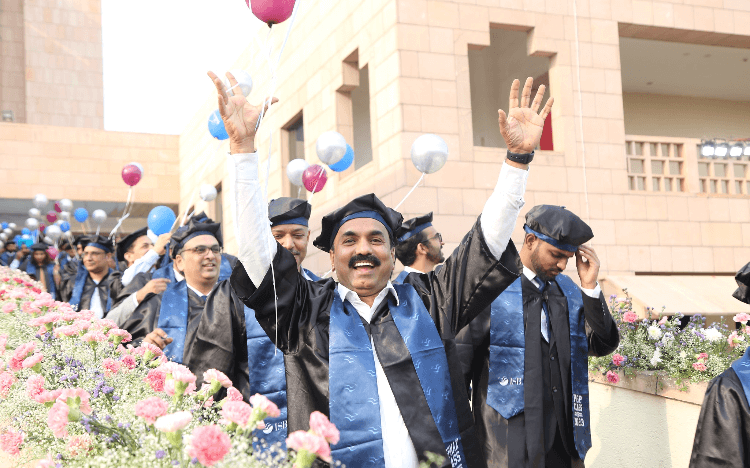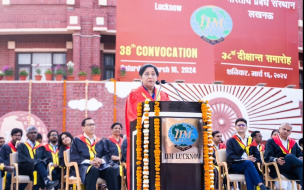For some time in India the MBA has been a highly sought-after route for career progression and personal development.
MBA programs provide a wide array of specializations, each designed to equip students with the skills and knowledge required to excel in a variety of sectors and roles within the business sphere.
In this deep dive, BusinessBecause explores the top MBA specializations in India, breaking down their curriculums, highlighting the skills that students gain, and identifying the top institutions that provide these programs.
Top MBA Specializations In India
1. Finance
Finance is one of the most sought after areas among the MBA specializations list in India. The finance curriculum typically covers areas such as financial management, investment analysis, risk management, financial markets, and corporate finance.
Students gain analytical and strategic skills, enabling them to make informed decisions in the complex world of finance.
Top colleges for MBA specializations in finance include the Indian Institutes of Management (IIMs), Indian School of Business (ISB), Xavier School of Management (XLRI), and Faculty of Management Studies (FMS) Delhi.
Finance Curriculum:
⇨ Financial Management: This course delves into the principles of financial management, focusing on topics such as capital budgeting, working capital management, and financial statement analysis.
⇨ Investment Analysis: Students learn about investment strategies, portfolio management, and the evaluation of financial instruments like stocks and bonds.
⇨ Risk Management: This course explores techniques for identifying, assessing, and mitigating financial risks.
⇨ Financial Markets: Students gain an understanding of financial markets, including stock exchanges, bond markets, and derivatives markets.
⇨ Corporate Finance: The curriculum covers financial decision-making within organizations, including capital structure and dividend policies.
Top Finance Skills MBA Students Gain:
⇨ Financial Analysis: Graduates become adept at analyzing financial data and assessing the financial health of companies.
⇨ Investment Planning: They can develop and execute investment strategies, optimizing returns while managing risks.
⇨ Risk Assessment: Graduates are skilled in identifying and managing various financial risks, such as market risk and credit risk.
⇨ Financial Decision-Making: MBA finance graduates can make sound financial decisions that align with the organization's objectives.
2. Marketing
Marketing is another popular MBA specialization in India. The marketing curriculum typically includes courses on consumer behavior, marketing strategies, brand management, and market research.
Students develop strong analytical and creative skills, enabling them to navigate the dynamic marketing landscape.
Top colleges offering marketing specializations include IIMs, SP Jain Institute of Management and Research (SPJIMR), Narsee Monjee Institute of Management Studies (NMIMS), and Management Development Institute (MDI) Gurgaon.
Marketing Curriculum:
⇨ Consumer Behavior: This course explores the psychology and behavior of consumers, helping students understand buying patterns.
⇨ Marketing Strategies: Students learn to develop effective marketing plans, including product positioning, pricing, promotion, and distribution.
⇨ Brand Management: The curriculum covers brand development, brand equity, and strategies for building and managing strong brands.
⇨ Market Research: Students acquire skills in market research techniques, including surveys, focus groups, and data analysis.
Top Marketing Skills MBA Students Gain:
⇨ Market Analysis: Graduates can analyze market trends, competition, and consumer preferences to formulate effective marketing strategies.
⇨ Product Management: They are equipped to manage products throughout their lifecycle, from ideation to launch and beyond.
⇨ Branding: MBA marketing graduates can create and manage brand identities, enhancing brand equity and customer loyalty.
⇨ Marketing Strategy Development: They can develop comprehensive marketing strategies that align with business objectives.
3. Human Resource Management (HRM)
Human Resource Management (HRM) is a specialization focused on people management within organizations.
The curriculum includes HR strategy, organizational behavior, labor laws, talent management, and performance appraisal. Students develop strong interpersonal and leadership skills, preparing them for roles in HR and organizational development.
Top colleges offering HRM specializations include XLRI, Tata Institute of Social Sciences (TISS) Mumbai, and Symbiosis Institute of Business Management (SIBM) Pune.
HRM Curriculum:
⇨ HR Strategy: This course explores the alignment of HR practices with organizational goals and strategies.
⇨ Organizational Behavior: Students learn about employee motivation, team dynamics, and workplace culture.
⇨ Labor Laws: The curriculum covers labor legislation and regulations, essential knowledge for HR professionals.
⇨ Talent Management: Students acquire skills in recruitment, training, and talent development.
⇨ Performance Appraisal: This course delves into methods for evaluating employee performance and providing feedback.
Top HRM Skills Students Gain:
⇨ Recruitment: MBA HRM graduates can effectively identify and hire the right talent for organizations.
⇨ Employee Relations: They are skilled in managing employee relations, addressing conflicts, and fostering a positive workplace culture.
⇨ Talent Development: Graduates can design and implement training and development programs to enhance employee skills and performance.
⇨ HR Strategy Formulation: They can align HR practices with overall business strategies.
READ: Financial Times MBA Ranking | Top Colleges For An MBA In India
©IIM Indore/Facebook
4. Operations Management
Operations Management focuses on the efficient management of business processes and supply chains. The curriculum includes courses in supply chain management, logistics, quality control, and operations strategy.
Students develop problem-solving and analytical skills crucial for optimizing operations. Top colleges for operations management include IIMs, National Institute of Industrial Engineering (NITIE) Mumbai, and Indian Institute of Technology (IIT) Delhi - Department of Management Studies (DMS).
Operations Management Curriculum:
⇨ Supply Chain Management: Students learn about the end-to-end supply chain, from sourcing to delivery.
⇨ Logistics: This course covers the efficient management of goods and materials throughout the supply chain.
⇨ Quality Control: Students acquire skills in quality assurance, process improvement, and Six Sigma methodologies.
⇨ Operations Strategy: The curriculum focuses on aligning operations with overall business goals.
Top Operations Management Skills Students Gain:
⇨ Supply Chain Optimization: Graduates can optimize supply chains for efficiency, cost reduction, and responsiveness.
⇨ Process Management: They excel in managing and improving business processes for better performance.
⇨ Operations Strategy: MBA operations management graduates can develop and implement operations strategies that drive business success.
5. Information Technology (IT) Management:
IT Management is an increasingly important specialization in the digital age.
The curriculum covers IT strategy, database management, cybersecurity, and digital transformation. Students develop a blend of technical and managerial skills, enabling them to lead IT initiatives within organizations.
Top colleges for IT management include IIM Bangalore, IIT Kharagpur (Vinod Gupta School of Management), and Symbiosis Centre for Information Technology (SCIT).
IT Management Curriculum:
⇨ IT Strategy: This course explores aligning IT with organizational goals and developing IT roadmaps.
⇨ Database Management: Students learn about database design, administration, and data analytics.
⇨ Cybersecurity: The curriculum covers security threats, risk management, and strategies to protect IT infrastructure.
⇨ Digital Transformation: Students gain insights into leveraging technology for business innovation and growth.
Top IT Management Skills Students Gain:
⇨ IT Project Management: Graduates can effectively plan and execute IT projects, ensuring they meet business objectives.
⇨ Cybersecurity Expertise: They are equipped to assess and mitigate cybersecurity risks, protecting critical business data.
⇨ IT Strategy Development: MBA IT management graduates can formulate IT strategies that drive digital transformation and innovation.
READ: Which Business School Has The Best ROI For MBA In India?
6. International Business (IB)
International Business focuses on the complexities of global trade, international marketing, foreign exchange, and cross-cultural management. The curriculum equips students with the skills to navigate the intricacies of international business environments.
Top colleges for IB include the Indian Institute of Foreign Trade (IIFT) Delhi/Kolkata, Symbiosis Institute of International Business (SIIB), and MDI Gurgaon.
International Business Curriculum:
⇨ International Marketing: This course covers strategies for entering and succeeding in international markets.
⇨ Global Trade: Students learn about trade policies, import-export regulations, and international trade agreements.
⇨ Cross-Cultural Management: The curriculum delves into managing diverse teams and adapting to different cultures.
⇨ Foreign Exchange: Students gain insights into currency markets, exchange rates, and risk management in international finance.
Top International Business Skills Students Gain:
⇨ International Market Analysis: Graduates can analyze foreign markets, assess risks, and identify opportunities.
⇨ Global Strategy: They can develop and implement strategies for expanding business operations across borders.
⇨ Cross-Border Business Operations: MBA IB graduates excel in managing international supply chains and cross-cultural teams.
7. Entrepreneurship
Entrepreneurship is an exciting specialization for those aspiring to start their businesses or work in startup ecosystems.
The curriculum covers startup strategy, business planning, venture capital, and innovation management. Students develop a blend of creativity, strategic thinking, and risk-taking abilities.
Top colleges offering entrepreneurship specializations include IIM Bangalore (NSRCEL), ISB Hyderabad (DLabs), and SPJIMR (Center for Entrepreneurship).
Entrepreneurship Curriculum:
⇨ Startup Strategy: Students learn about formulating and executing strategies for new ventures.
⇨ Business Planning: The curriculum covers creating comprehensive business plans, including financial projections.
⇨ Venture Capital: Students gain insights into raising funds from venture capitalists and angel investors.
⇨ Innovation Management: The course explores techniques for fostering innovation and creativity.
Top Entrepreneurial Skills Students Gain:
⇨ Entrepreneurial Mindset: Graduates are equipped with the mindset and skills needed to launch and grow successful startups.
⇨ Business Planning: They can create detailed business plans, outlining strategies, and financial projections.
⇨ Funding Strategies: MBA entrepreneurship graduates can navigate the complex world of venture capital and secure funding for their ventures.
READ: Top 10 MBA Colleges In India 
©IIM Lucknow/FB
8. Healthcare Management
Healthcare Management is a specialization focused on the unique challenges of the healthcare industry.
The curriculum includes healthcare policy, hospital management, healthcare IT, and pharmaceutical management.
Students develop a deep understanding of healthcare operations and policies. Top colleges offering healthcare management include TISS Mumbai (School of Health Systems Studies) and SIBM Pune (Healthcare Management).
Healthcare Management Curriculum:
⇨ Healthcare Policy: Students learn about healthcare policies, regulations, and public health challenges.
⇨ Hospital Management: The curriculum covers managing healthcare facilities, patient care, and healthcare quality.
⇨ Healthcare IT: Students gain insights into the use of technology in healthcare, including electronic health records (EHRs) and telemedicine.
⇨ Pharmaceutical Management: The course explores the pharmaceutical industry, including regulatory compliance and marketing.
Top Healthcare Management Skills Students Gain:
⇨ Healthcare Operations: Graduates can efficiently manage healthcare facilities and navigate the complexities of healthcare delivery.
⇨ Healthcare Policy Analysis: They excel in analyzing healthcare policies and advocating for effective changes.
⇨ Healthcare Technology Management: MBA healthcare management graduates can leverage technology to improve patient care and streamline healthcare processes.
9. Rural Management
Rural Management is a specialization that focuses on the development of rural areas.
The curriculum includes rural development, agricultural management, rural marketing, and social entrepreneurship. Students acquire skills essential for driving positive change in rural communities.
Top colleges for rural management include Xavier Institute of Management Bhubaneswar (XIMB) and Institute of Rural Management Anand (IRMA).
Rural Management Curriculum:
⇨ Rural Development: This course explores strategies for rural development, including infrastructure and community development.
⇨ Agricultural Management: Students learn about agricultural practices, crop management, and rural livelihoods.
⇨ Rural Marketing: The curriculum covers marketing strategies tailored to rural markets and consumers.
⇨ Social Entrepreneurship: Students gain insights into creating and managing ventures that address rural challenges.
Top Rural Management Skills MBA Students Gain:
⇨ Rural Development Strategies: Graduates can formulate and implement strategies for sustainable rural development.
⇨ Social Entrepreneurship: They excel in creating and leading initiatives that drive positive social and economic change in rural areas.
⇨ Agricultural Management: MBA rural management graduates can contribute to improving agricultural practices and rural livelihoods.









